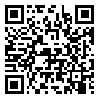Volume 10 -
IJMEHM 2017, 10 - : 282-290 |
Back to browse issues page
Mohsen Rezaei Aderyani1 
 , Saeid Nazari Tavakkoli *
, Saeid Nazari Tavakkoli * 
 2, Mehrzad Kiani3
2, Mehrzad Kiani3 
 , Mahmood Abbasi3
, Mahmood Abbasi3 
 , Mohsen Javadi4
, Mohsen Javadi4 


 , Saeid Nazari Tavakkoli *
, Saeid Nazari Tavakkoli * 
 2, Mehrzad Kiani3
2, Mehrzad Kiani3 
 , Mahmood Abbasi3
, Mahmood Abbasi3 
 , Mohsen Javadi4
, Mohsen Javadi4 

1- Qom University of Medical Sciences, Tehran, Iran
2- Tehran University, Tehran, Iran ,sntavakkoli@ut.ac.ir
3- Shahid Beheshti University of Medical Sciences, Tehran, Iran
4- Qom University, Qum, Iran
2- Tehran University, Tehran, Iran ,
3- Shahid Beheshti University of Medical Sciences, Tehran, Iran
4- Qom University, Qum, Iran
Abstract: (6065 Views)
Medical ethics is an old science. Some of its issues have historical precedence, and others are modern challenges, and have emerged with advances in technology. One of such historic but newly emerging challenges is "bi’natijeghi-e-pezeshki (futile treatment)", which is defined as the treatment that cannot achieve its goal. This term entered medical literature as "medical futility" in late 1980s. Based on this investigation, it can be concluded that this term should only be used when the desired outcome following medical procedure and the outcome sought by the medical team and patient/family (patient's health) is unlikely to be realized. There are various equivalents for this term in our country (Islamic Republic of Iran), including "bi’fayedegi-e-pezeshki (medical uselessness)", "bi’houdeghi (frivolity) in medicine", and even "inappropriate treatment". The present article aimed to find a suitable Persian equivalent for this concept. The use of interpretations such as "frivolity" or "uselessness" may cause misunderstanding between patient/family and the medical team, and can ruin the trust between patient/family and the medical team. Thus, the best alternative to this English term appears to be "bi’natijeghi-e-pezeshki (futile treatment)".
Type of Study: commentary |
Subject:
Medical Ethics
Received: 2017/11/28 | Accepted: 2018/02/24 | Published: 2018/03/17
Received: 2017/11/28 | Accepted: 2018/02/24 | Published: 2018/03/17
| Rights and permissions | |
 |
This work is licensed under a Creative Commons Attribution-NonCommercial 4.0 International License. |
